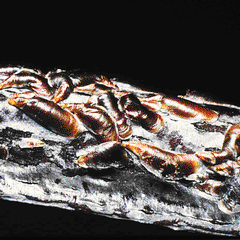The Ortho Home Gardener's Problem Solver
Armored Scales
 Description
Description
Armored scales appear as somewhat flattened bumps, either round or very elongated, and are often clustered together on leaves, stems, or bark. Small, immobile, soft-bodied insects live beneath these shells, which are made of wax and cast skins. The shells are not attached to the insect; if the shells are picked off, the insects remain attached to the plant. Females lay their eggs underneath the shells. The young scales, called crawlers, are active, usually moving from beneath their mothers' shells to find suitable feeding sites. The crawlers eventually settle down in 1 spot, where they remain for the rest of their lives, feeding on plant sap. Some armored scales produce a toxin that causes discolored or dead spots on leaves or fruit. Armored scales do not produce honeydew, as other scales do.
Control
Mature scales are difficult to control because they are protected by their shell. Control is usually aimed at the crawlers, whose seasonal appearance varies with species. Spray crawlers with an insecticide containing acephate. Contact your local County Extension Agent (see County Extension Agents) to determine the best time to spray for scales in your area. A horticultural oil spray may be used very effectively to smother scales during the dormant season and the growing season. Since some plants are sensitive to oil sprays, check to make sure your plant is listed on the product label before spraying.
Copyright©1997. Books That Work.
Copyright©1982, 1993, 1997. Monsanto Company.
Visit Books That Work at http://www.btw.com
